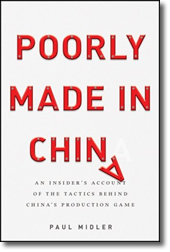Book Review: Poorly Made in China

Midler, Paul. Poorly made in China : an insider’s account of the tactics behind China’s production game. Wiley, 2009.
Paul Midler could be said to be biting the hand that feeds him. After all, he has built a lucrative career as a China-based manufacturing consultant, using his expert knowledge and insight into Chinese history, language, and culture. And yet, he has penned a work that, while frank in its admiration for many Chinese cultural idiosyncrasies, is also sharply critical of both the questionable ethical basis on which the Chinese have built their gargantuan export economy, and the impatience and greed of American businesses in rushing to embrace the perceived advantages of having their product lines manufactured in China.
In the 240 smoothly written and eminently readable pages of Poorly Made In China, Mr. Midler recounts his daily experiences in creating and managing relationships between Chinese factory owners and American importers, giving us example after example of why the Chinese, in his opinion, win at every hand dealt at the negotiating table of price and quality. Thus the importer and the U.S. consumer often have a good chance of ending up with a product that either degrades in quality over time or increases in cost without benefit to the consumer, or both.
For example, a manufacturer will agree to initial product specifications at a price the importer jumps at. The manufacturer then figures out how to unilaterally change some specifications for his own increased profit, while appearing to offer the same product. A shampoo bottle might be made of progressively thinner plastic in order to save the manufacturer on material costs. When the importer discovers a shipping container full of collapsed bottles and unsaleable product, the manufacturer says there is a production problem.
The importer demands that it be corrected. The manufacturer agrees that it should be fixed, but it is not possible at the originally agreed price point, so the price on the product goes up in order to restore the original quality. If this sounds like negotiating in bad faith, read Mr. Midler’s book to find out why, on the shores of mainland China, foreign importers have no choice but to play by Chinese rules or take their business elsewhere, and why many importers have realized that this is no choice at all.
Epilogue: Midler also points out that the Western stigma attached to the production of “counterfeit” goods does not exist on the same scale in China due to their cultural reverence for the skill of the artist / producer — even if the goods are not original creations. Midler’s point is driven home by a recent Wall Street Journal article (via ProQuest | via WSJ.com ) that describes the status of Hong Lei, creator of China’s popular “Tomato Garden” pirate edition of Windows XP.
“People regard Hong Lei as a talent, a national hero,” said Liu Fengming, vice president for Microsoft in Greater China. “This is part of the problem.”
Guest reviewer Marlys Ray is a librarian at the Institute on Aging at the University of North Carolina at Chapel Hill.
Tags: Business Ethics, Case studies, China